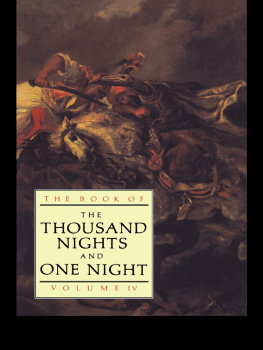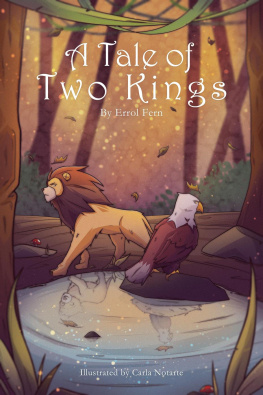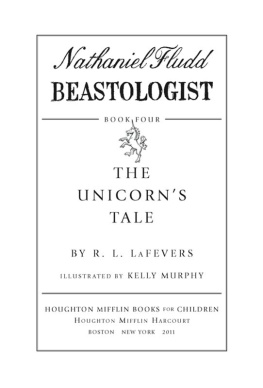This edition published in the Taylor & Francis e-Library, 2005.
All rights reserved. No part of this book may be reprinted or reproduced or utilized in any form or by any electronic, mechanical, or other means, now known or hereafter invented, including photocopying and recording, or in any information storage or retrieval system, without permission in writing from the publishers.
The Tale of Pearl-Harvest
AND SHAHRAZAD SAID TO KING SHAHRYAR:
IT is related in the writings of the wise past that the Commander of the Faithful, al-Mutasid Billah, sixth Khalifah in the line of Abbas, grandson of al-Mutawakkil, grandson of Harun al-Rashid, was a prince of lofty soul and fearless heart. He was noble and beautiful, royal and intelligent, he had the courage and strength of lions, and a genius which made him the greatest poet of his time. He kept sixty zealous wazirs about him in Baghdad to watch day and night over the welfare of his people; so that no trifle escaped him in all his mighty empire, from the desert of Sham to the Moorish confines, from the mountains of Khurasan and the western sea to the furthest bounds of India and Afghanistan.
One day, as the Khalifah was walking with Ahmad ibn Hamdun, his intimate friend and chosen cup-companion (to whom we owe the oral transmission of the fairest tales and verses of our ancestors), he came to a lordly dwelling folded pleasantly among gardens. Its harmonious architecture said more of its owners fine taste than the tongue of an eager friend, and to a man of the Khalifahs subtle and attentive soul seemed eloquence itself.
As the two men sat down on a marble bench which faced the gate, to rest from their walking and breathe an air laden with the souls of jasmine and lily, they saw two youths of moon-like beauty coming towards them out of the shades of the garden. One was saying to the other: Would that heaven might send some chance guests to our master on this delightful day. He is sad when he has to eat alone. This is the first time that such a thing has happened, answered the second youth. It is strange that no citizen has walked out to see our gardens on this fair Spring day.
These words astonished al-Mutasid in two particulars: that there should be a lord of high rank so near at hand whose name he did not know, and that this lord should have so strange a taste as to dislike solitude. I am the Khalifah, he said to himself, and yet I often love to be alone. I would soon die if I had to feel some strange life for ever beating with mine. There is nothing so precious as occasional loneliness. Then to his companion he said: O Hamdun, O honey-tongued teller, surely you, who know the present as well as the past, have some knowledge of the man who owns this palace? Do you not think that we should make ourselves known to so strange a being? Do you not find this an occasion for proving that we also can be generous to a chance acquaintance? I do not think the Commander of the Faithful would ever regret a visit to this man, answered Hamdun. I will call those two delightful boys and tell them to announce our presence to their master. He left al-Mutasid sitting, in his usual disguise as a merchant, and went up to the youths, saying: The blessing of Allah be upon you! Tell your master that two strange merchants beg to be allowed to present their homage to him. The two boys ran joyfully to the palace, and very soon the master of that place appeared upon the threshold.
At this point Shahrazad saw the approach of morning and discreetly fell silent.
But when the eight-hundred-and-fifteenth night had come
SHE SAID:
He was a man of kindly aspect and great elegance, with delicate features and a clear-cut face, dressed in a tunic of silk from Nisabur, having a mantle of gold-fringed velvet over his shoulders and a ruby ring upon his finger. He came forward with a smile of welcome and pressed his left hand to his heart, saying: Cordial greeting to the kind lords who honour us with the supreme favour of their coming!
He then led them into his palace, and they supposed that they were straying among the chambers of Paradise, for the interior beauty of that place was greater than the exterior, and would have made a tortured lover forget love.
In the guest hall a little garden was mirrored by singing diamonds of water which fell into an alabaster basin; from its very smallness it was an enchantment and a cool delight. For if the great gardens belted that palace with all the flowers and green leaves of Allah in a bright riot which was near to folly, the little garden was the very wisdom of flowering things. It held four blossoms only; but the like of those blossoms has not been seen since the first innocence of time.
The first was a rose lolling upon her stem; not a rose of rose trees, but the rose of the world, sister of the rose which flowered in Eden before the coming of the angry sword: a flame of red gold, a glowing fire of joy, a velvet virginal blood-tinted cloud. Its heart burned with the purple of a kings robe and its scent upon the breeze opened the fans of the heart, saying to the soul: Be drunk! and to the body: Here are wings!
The second was a tulip, tall and lonely; not the tulip of a Sultans terrace, but the tulip of fable, fed on the blood of dragons in ManyColumned Iram. Its colour said to a cup filled with old wine: Their lips do not touch me and yet I madden them! and to a flaming coal: Lo, I am not consumed!
The third was a straight hyacinth; not of earths gardens, but hyacinth, mother of lilies; a white fragility, saying to the swan: Return to the water, for I am queen!
The fourth was a carnation leaning lonely; not such as young girls water at evening, but an incandescent bubble, a fragment torn from the western sun, a crystal holding the soul of peppers; brother to that carnation which the King of the Jinn gave to Sulaiman to lie in the hair of Bilkis; from which our Lord made the Elixir of long life, the spiritual Balm, the royal al-Kila, the Theriac.
Even when the diamond of the fountain was still, the water moved a little in emotion to reflect these flowers.
There was nothing to take the eye in that hall of white marble save these flowers; but the eye was satisfied.
The Khalifah and his friend sat upon a couch covered with the carpets of Khurasan, and fed exquisitely from heavy gold plate upon low bamboo tables. It was a feast of friends, made gay by the coming of four girls: a lutanist, a cymbal player, a singer and a dancer. While these concerted a harmonious entertainment, the host and his guests drank wine and ate fresh fruit.
Though Ibn Hamdun, the teller of tales, was used to the sumptuous entertainments of his master, the generous wines and chosen beauty of that place inspired him to make a song about a certain youth who was a friend of his. In his fine voice, he sang:











